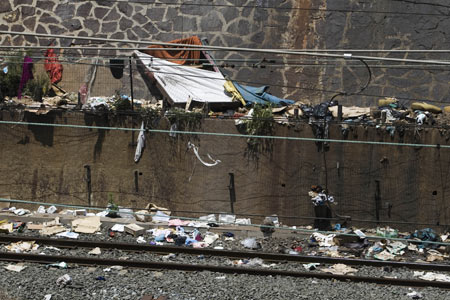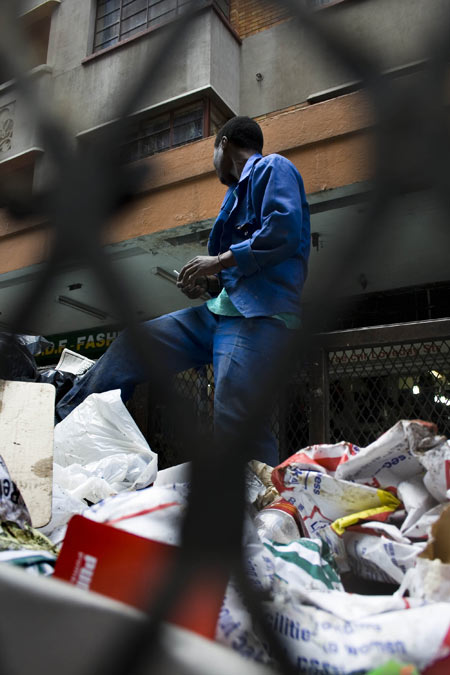A walk in downtown Johannesburg can be a stinky affair. Commuters waiting at the Noord taxi rank hold their breath while street vendors sell plates of fruit and vegetables near overflowing rubbish bins.
The stench is overwhelming, yet Pikitup — the city’s official waste-management service — says Johannesburg is being kept clean.
The city says Johannesburg has been rated at “level four” on a cleanliness scale of one to five. An area with a level-five rating means ‘100% clean no litter on a 24/7 basis.”
The definitions and the rating system was agreed upon by the City of Johannesburg’s infrastructure and services department and Pikitup.
So, at least on paper, the city is now largely free of litter.
‘Vast improvement’
Pikitup, which is owned by the city, told the Mail & Guardian this week that it had noted vast improvements in the city’s cleanliness levels.

Dump: Commuters in downtown Johannesburg avoid a heap of rubbish lying near the bin. (Delwyn Verasamy, M&G)
Pikitup blames the culture of littering and people’s attitudes towards waste.
“The reality is that indiscriminate littering and illegal dumping by residents critically affects Pikitup’s capacity to maintain and clean the city,” says Pansy Jali-Oyedele, acting communications manager for Pikitup.
Jali-Oyedele said it appears that some Johannesburg residents believe they’re actually creating jobs for the street sweepers by littering.
However, illegal dumping costs up to five times more to clean up and it costs the city more than R100-million a year.
 Bedding down: An old bed has been abandoned next to the railway tracks near the Johannesburg Art Gallery. (Delwyn Verasamy, M&G)
Bedding down: An old bed has been abandoned next to the railway tracks near the Johannesburg Art Gallery. (Delwyn Verasamy, M&G)
Pikitup say they’re trying to change Johannesburg residents’ attitudes towards littering and launched a “Clean City” campaign in 2009.
The two-year campaign aims to ensure the cleanliness of the city “through education and law enforcement”, said Jali-Oyedele.
It’s unclear, however, how effective the campaign has actually been.
‘Rotten things’
Sophie*, a street sweeper, wears an orange overall, a hat to keep the sun of her face, and carries a large number of black plastic bags. She starts work at 6.30am and cleans between Klein and Noord streets in downtown Johannesburg.
“It’s a not an easy job,” says Sophie, “particularly when you have to pick up rotten things”.
Pikitup says cleaning never stops in the inner city and there are cleaning staff at work 24 hours a day, seven days a week.
Fancy Moche, a Yeoville resident, believes there is still too much rubbish littering the streets in the inner-city suburb.
Amid the empty cans of Coke and plastic bags in the streets of Yeoville are old beds and sofas.
 A load of rubbish: A rubbish collector gets to grips with a load of refuse. (Delwyn Verasamy, M&G)
A load of rubbish: A rubbish collector gets to grips with a load of refuse. (Delwyn Verasamy, M&G)
Moche blames the locals, but adds that Pikitup seems not to have prioritised the suburb.
“The rubbish dumps are full, so there are no other alternatives other than to leave your rubbish in plastic bags on the streets.”
Moche says this in turn has drawn rats to the piles of rubbish.
“Yeoville is full of rats. At the corner of Hunter and Cavendish roads there is a rat-infested park close to the Shoprite on Rocky Street.”
“A friend of mine who works at Shoprite told me not to buy meat there because the rats come in at night to eat bits of meat.”
Bin shortage
Part of the problem appears to be that Pikitup have run out of bins.
Most households in Johannesburg have been provided with a 240-litre wheelie bin, which is placed on the street once a week for rubbish collection. If the bin is stolen, the resident has to report the theft to the police station to receive another bin. However, Pikitup has not been supplied with new bins since about September 2009, forcing residents to illegally dump their rubbish on street corners.
A Kensington resident told the M&G that he was still waiting for his bin six months later.
“Every time I call Pikitup they say they are waiting for bins from their suppliers.”
A call-centre consultant who spoke to the M&G confirmed they had run out of stock, and blamed their suppliers.
- Pikitup services 1 625 square kilometres, reaching over one million dwellings
- Pikitup employs 2 707 people as well as contractors who assist in cleaning informal settlements and the inner city
- Pikitup collects approximately 1 600 000 tonnes of waste annually
* Not her real name